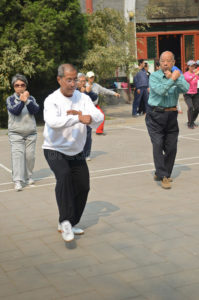Increase Self-Efficacy with Tai Chi
By John M. de Castro, Ph.D.
“The science of Tai Chi is just now catching up with and substantiating what Tai Chi practitioners have known for centuries – Tai Chi often leads to more vigor and energy, greater flexibility, balance and mobility, and an improved sense of well-being. Cutting-edge research now lends support to long-standing claims that Tai Chi favorably impacts the health of the heart, bones, nerves and muscles, immune system, and the mind.” – Peter Wayne
Self-efficacy is the belief in one’s ability to succeed in specific situations or accomplish a task. It is an important characteristic for the individual’s ability to effectively navigate the complex and stressful environments in the modern world. It is an important foundation for success in many areas of life. So, methods that could help to improve the development of self-efficacy may be very helpful for the individual throughout the course of their life. A relatively simple method to do this is Mindfulness training. Indeed, it has been shown to significantly improve self-efficacy.
Tai Chi is gentle and safe mindfulness practice. It is appropriate for all ages including the elderly and for individuals with illnesses that limit their activities or range of motion. It is inexpensive to administer, can be performed in groups or alone, at home or in a facility, and can be quickly learned. In addition, it can be practiced in social groups. This can make it fun, improving the likelihood of long-term engagement in the practice. So, Tai Chi practice would appear to be an almost ideal gentle mindfulness training and light exercise to improve psychological health and well-being and perhaps self-efficacy.
In today’s Research News article “Effects of Tai Chi on Self-Efficacy: A Systematic Review.” (See summary below or view the full text of the study at: https://www.ncbi.nlm.nih.gov/pmc/articles/PMC6114250/ ), Tong and colleagues reviewed and summarized the published research literature on the effectiveness of Tai Chi practice to improve self-efficacy. Their review of the literature revealed 27 studies, 20 of which were randomized controlled trials.
They report that the vast majority of the studies found that engaging in Tai Chi practice produced significant improvement in self-efficacy. This was true for college students and the elderly and for patients with diseases including arthritis, heart failure, Chronic Obstructive Pulmonary Disease (COPD), and other diseases. Unfortunately, although significant improvement were observed relative to baseline, many of the studies were of low quality or involved small numbers of participants resulting in a lack of significant differences compared to control groups.
Obviously, more research is needed employing stronger research designs and larger numbers of participants. But, the existing published research suggests that Tai Chi practice is a safe and effective method to improve self-efficacy in a wide range of people with or without diseases. Hence, this simple, inexpensive, convenient, safe, and fun practice may improve the participants ability to successfully conduct their lives, improving health and well-being.
So, increase self-efficacy with Tai Chi.
“In the search for effective ways to experience positive outcomes in the all-important life aspects such as overall health, well-being and mortality, one of the sleeper strategies to consider involves adopting an ancient Chinese practice called tai chi.” – Suzanne Kane
CMCS – Center for Mindfulness and Contemplative Studies
This and other Contemplative Studies posts are also available on Google+ https://plus.google.com/106784388191201299496/posts and on Twitter @MindfulResearch
Study Summary
Tong, Y., Chai, L., Lei, S., Liu, M., & Yang, L. (2018). Effects of Tai Chi on Self-Efficacy: A Systematic Review. Evidence-Based Complementary and Alternative Medicine : eCAM, 2018, 1701372. http://doi.org/10.1155/2018/1701372
The purpose of this systematic review is to summarize and update the readers regarding clinical studies that have investigated the effects of Tai Chi on self-efficacy and to describe their limitations and biases. Nine electronic databases were searched from the establishment of the database until August 10, 2017. All randomized controlled trials (RCTs), nonrandomized controlled studies (NRSs), quasi-experimental studies, or studies with pre-post design were included if they clearly defined a Tai Chi intervention and evaluated self-efficacy outcomes. We categorized these 27 studies into the “disease category” and the “population category,” based on the types of participants. This systematic review summarizes the effects of Tai Chi on self-efficacy in various populations and found that Tai Chi appeared to have positive effects on self-efficacy in some populations. Fifteen research studies showed that Tai Chi had significant positive effects on self-efficacy, while 11 studies did not; only one study found a negative outcome at the follow-up. In addition, it is unclear which type, frequency, and duration of Tai Chi intervention most effectively enhanced self-efficacy. Tai Chi appears to be associated with improvements in self-efficacy. Definitive conclusions were limited due to the variation in study designs, type of Tai Chi intervention, and frequency, and further high-quality studies are required.
https://www.ncbi.nlm.nih.gov/pmc/articles/PMC6114250/
